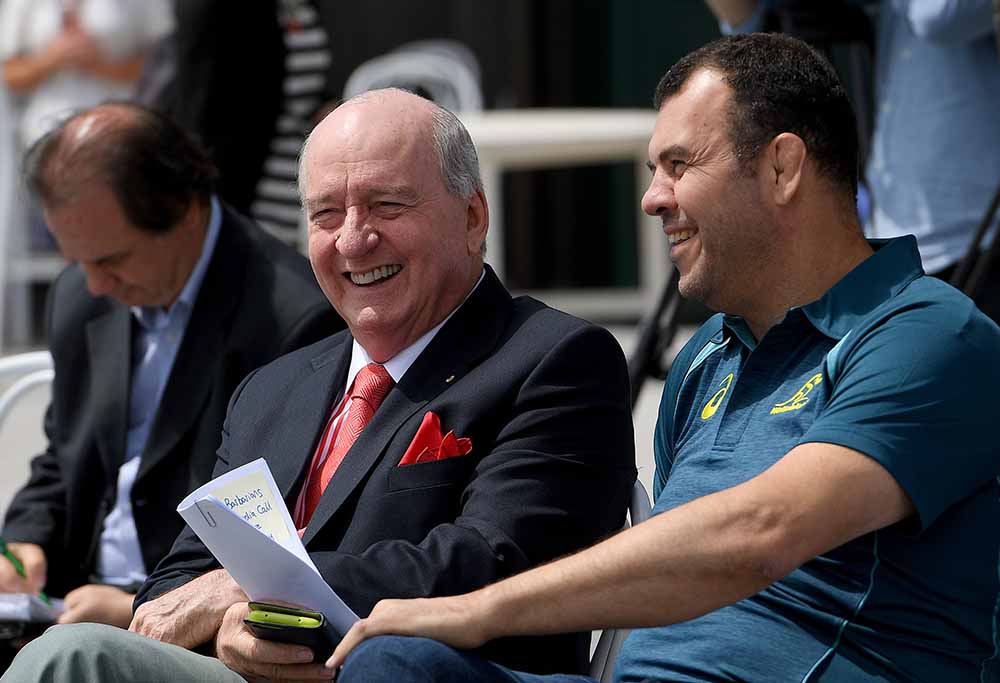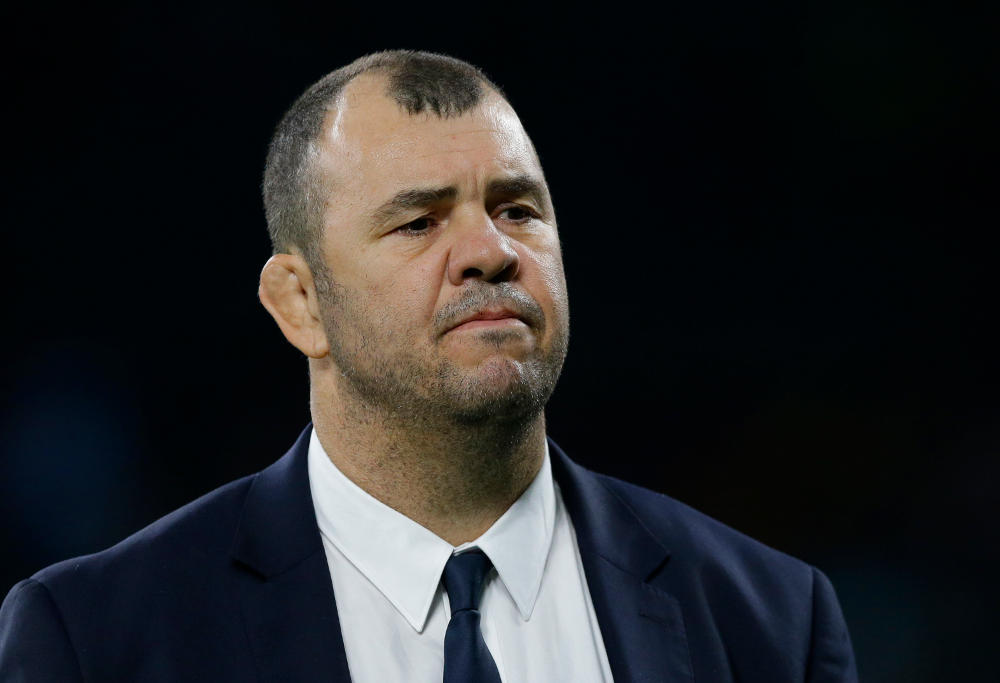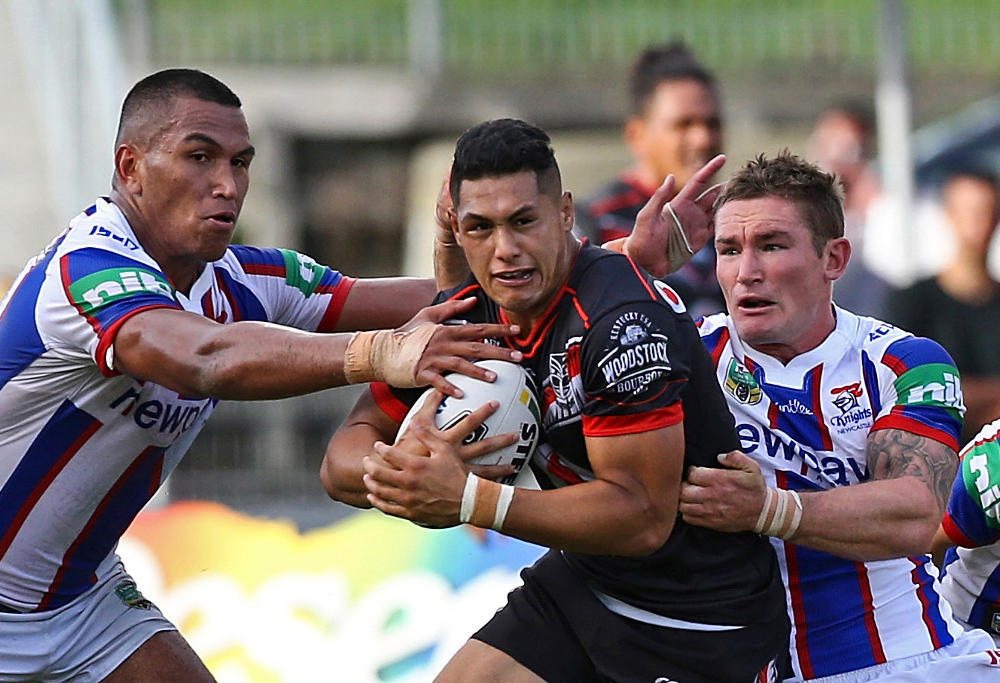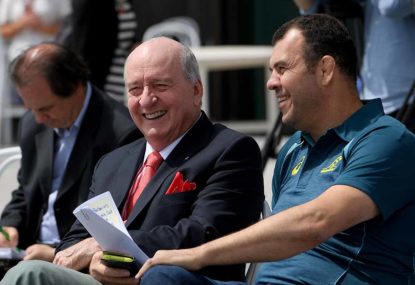With a rare Test victory against New Zealand secured last week in Brisbane, Australian rugby took the first positive steps forward in what seems like an age.
Leading news bulletins for all the right reasons – a gutsy win against the world champions – had many fans pinching themselves in disbelief, and raised hopes that rugby, after a horrible year on and off the field, was turning the corner.
It was all too good to last.
Kicking the ARU (Now known as Rugby Australia) is now a more popular sport than rugby itself, possibly because it’s so easy to do. Disenfranchised fans lay blame on city hall for all matters ranging from the demise of the Western Force, to neglect of grass roots rugby, declining playing and coaching standards, financial indigence and little Johnny from the Warnervale under-8s missing out on his half-time orange.
Much of the criticism fails to take proper account of the global forces outside Rugby Australia’s control and how these negatively impact on the ruling body’s ability to retain quality players and coaching IP in Australia, and generate revenue proportionate to their northern hemisphere counterparts.
Invariably, Rugby Australia’s critics also demonstrate what has become the distinctly Australian trait of whingeing about all that is wrong without themselves offering any viable alternative solution, or genuinely acknowledging the depth and complexity of the problem.
All of which makes Rugby Australia’s effort to shoot itself in the foot this week all the more inexplicable and disappointing.
Note that this isn’t a ‘wise guy after the event’ column. Jack Dempsey and Lukhan Tui might have injured themselves in any game of rugby, at training, or by slipping in the bath. But, for any number of reasons outlined previously in this column and by my colleague Brett McKay, the Wallabies versus Barbarians match was an unmitigated disaster.
One of rugby’s greatest challenges is to find a way for everyone in professional rugby to play less. National unions and English and French clubs are so focused on self-preservation and are so suspicious of each other that they dare not leave a weekend free in case the slot is commandeered by someone else, and the opportunity for them to squeeze an extra few dollars is lost.
When rugby turned professional in 1995 the Wallabies played six Test matches that year. Last year they played 16. Perhaps determining that this year’s schedule of 14 Test matches was insufficient, Rugby Australia added a 15th, resurrecting the Barbarians for this Sydney encounter.
Even in these days of crowded schedules, coaches, players and fans all find ways establish a rhythm to the season. It is impossible to stay ‘up’ continuously, and there are obvious milestones and points identified as opportunities to reflect and recharge before moving on to the next challenge.
This weekend was clearly one of those points. A chance to bask in the positive afterglow of the win against New Zealand, before looking towards Japan and then a gnarly three-match UK tour, complete with Eddie Jones and his band of tricks sure to ramp up the pressure a few more notches.
It was also a chance for Rugby Australia to shine a spotlight onto their own developing competition, the NRC, with many sides competing this weekend for a finals place. 2017 has seen more progress made – baby steps to be sure, but nevertheless more willingness on the part of fans to engage with what is a worthy competition. For Rugby Australia to ‘foul its own nest’ and kill momentum at such a crucial time is beyond comprehension.
If Rugby Australia was looking to help coach Michael Cheika out with a selection trial, or to help build combinations in the Wallabies then surely the match should have been played prior to the June internationals. If the motive was purely financial, then whoever believed that 30,000-plus paying fans might roll up to Allianz Stadium to watch two scratch teams play like scratch teams clearly has no feel for the prevailing rugby mood.
Along with the thousands of Sydney fans who stayed at home, New Zealand rugby broadcaster Sky Sports read that mood correctly, keeping their money in their pocket and steering well clear.
It was no surprise to see first-choice Wallaby Bernard Foley outside the ground before the match mingling with fans, but the way he was standing on Driver Ave did make it seem like he was desperately soliciting any random passers-by to come in and watch.
If Rugby Australia also thought that this was a way to get one of their most vocal critics – the inexplicably influential Alan Jones – inside the tent pissing out instead of outside pissing in, that notion also spectacularly exploded in their face within minutes of the match ending.
Jones launched into a spectacular rant, specifically targeting referee Brendan Pickerill for ruining the match, in particular sin-binning two Barbarians players and denying a first-half try to Taniela Tupou from an ‘under the jumper’ tap move.

(AAP Image/Dan Himbrechts)
Jones’ comments were so unhinged they barely warrant commentary. The idea that because this was a Barbarians match the referee should therefore take a lenient view and simply let play flow is flawed in the extreme – which offences exactly should he let go and which ones should he blow up? What happens if Tupou decides to hide the ball up his jumper next time and the time after?
Jones and other critics conveniently forget that while memorable, running Barbarians matches of 1973 (versus the All Blacks) and 1984 (versus the Wallabies) achieved exalted status, they were refereed with integrity; as they should have been, as if they were ‘proper’ Test matches.
This match was not the spectacle it should have been not because of Pickerill, but because of the inability of the players to execute handling and passing skills worthy of the occasion. It was a timely reminder that despite the Wallabies success in Brisbane, there is still a long way to go to bring the collective and individual skill level of the professional playing group in Australia up to the top echelon.
In this respect, the comments of Ten broadcasters Gordon Bray and Matthew Burke were disappointing. Perhaps on another day with another referee, Quade Cooper may have escaped with a warning for his high tackle on Israel Folau, instead of a yellow card. But to excuse Cooper simply because it’s a Barbarians match or because he was ‘unsighted’ is a nonsense.
Unsighted or not, Cooper, like any player, knows that to jump into a tackle increases the likelihood that contact will be made with the head of the ball carrier. Anyone wanting to know when Cooper might be restored to a Wallabies jersey need only watch Cheika’s expletive-loaded reaction to the tackle for the answer to that question – about the same time Bill Pulver is elected West Australian premier.
So what did Cheika learn from the game itself? Pre-match he suggested that there were two spots open – at lock and in the midfield. On cue, it was lock Luke Jones who stood up and imposed himself on the game, but given that he is now ineligible for Wallabies selection that was probably not what Cheika had in mind.
In the midfield Bill Meakes confirmed what we already knew – he is too easily prone to losing the ball in contact – and the defensive combination of Duncan Paia’aua, Meakes and Samu Kerevi leaked like a sieve.
We also learned that young hooker Jordan Uelese is made of stern stuff – surviving a Cliff Palu thunderbolt – and that Tupou is indeed a rare and special talent. Also, Ben McCalman worked very hard to remind everyone that he is not the ‘forgotten man’ of Australian rugby.
The overriding factor however was a sense that here were 30 players waiting around for Michael Hooper to show them the way. Hooper’s absence may have cost the game the spark it needed, but at least it ensured he didn’t get invalided out of the UK tour – a small win for Rugby Australia.
Or should I say, ‘Rugby AU’, the governing body this week formally moving headquarters to the Moore Park precinct and taking the opportunity to rebrand and rename itself in the process. With Rugby AU it’s hard to know whether Bill Pulver has recently started watching hit New Zealand animated TV series Brotown, or if this is the type of thing that fans actually take notice of at all.
There are many in the game who warned against Rugby Australia spending up large on a new ‘Taj Mahal’ in times of financial hardship, but if the outcome at least puts an end to stale, clichéd criticism of north shore elitism the move will have achieved something.

(AP Photo/Alastair Grant)
This week also saw the re-emergence of Andrew Forrest, if only to let people know that he was still around and, even if his proposed competition might be a bit slower coming to fruition than first anticipated, he remains fully committed to creating the ‘most popular rugby competition in the world.’
It remains harder than ever to get a handle on where and how any such competition will find a slot in rugby’s crowded schedule. However, as long as a man with Forrest’s means insists that he is prepared to make whatever financial investment is required to ensure that player salaries will be sufficient to entice players away from other professional competitions – particularly in Japan – the chance of something good eventually coming from all of this mess cannot be dismissed.
Others will have found amusement in Forrest proclaiming that his competition would serve as a “petri dish” for rugby’s development – for some a place where mould grows, for others a place where meaningful cultures are developed. With Forrest hinting that he would be happy to see his competition used for experimental laws, perhaps he should be talking more to Alan Jones?
Elsewhere, cheeky Irishman Bundee O’Aki is now a step closer to making his Test debut in emerald green, while Ben Smith, Damien McKenzie and Jordie Barrett all lost sleep with the news that Roger Tuivasa-Sheck was planning a switch to rugby in time for the 2019 Rugby World Cup.
Tuivasa-Sheck’s manager Bruce Sharrock predictably refused to rule the rumour out, a tactic as disrespectful to the NZRL in the midst of a World Cup campaign of their own as it is a hackneyed and clumsy device to extract more contract dollars for his client. It’s about as original as the Channel Seven league commentator who suggested, as Papua New Guinea raced to a 32-0 lead in their pool match against Wales, that “it was important that Wales be the next side to score.”

(AAP Image/David Rowland)
Less predictable was the fallout from hijinks aboard British Navy submarine HMAS Vigilant, with a number of servicemen and women, including the Commander, dismissed for various offences, including inappropriate relationships with subordinates, cocaine use and – in one mind-boggling instance – sex with a prostitute.
A sailor and a prostitute – who would have thought? Is the AFL now responsible for British Navy operations or has the world really changed that quickly?
Back on firmer footing, Western Province claimed the Currie Cup with an upset 33-21 away win against the Sharks in Durban. Boom Sharks fly-half Curwin Bosch is a great prospect but he endured a tough lesson about how different finals football is from regular football, suffering defensively and at the kicking tee.
By contrast Canterbury fly-half Richie Mo’unga dominated the Mitre 10 Premiership final, scoring 25 points in a break-out match for him that will go a long way to securing his place in future All Black line-ups. Mo’unga too has had his share of lows this season – notably against the British and Irish Lions – but has noticeably matured and added a sharp running game to his repertoire, as his confidence has grown. Canterbury 35, Tasman 13.
There was sparkling running too in Friday nights’ Championship final between Wellington and Bay of Plenty, won by Wellington 59-45 in extra time, after Bay of Plenty had somehow scrambled back to 40-40 at the end of 80 minutes.
That they did so was in no small part due to two tries by sevens winger Joe Webber, showing superb evasiveness and pace – the second as good an individual try scored this season, anywhere.
It was fitting that the Sky Rugby comments man on duty was Christian Cullen who, in marvelling at Webber, must surely have had a memory flicker back to the glory days when it was he who lit up the same stadium with such silky running.
































































































